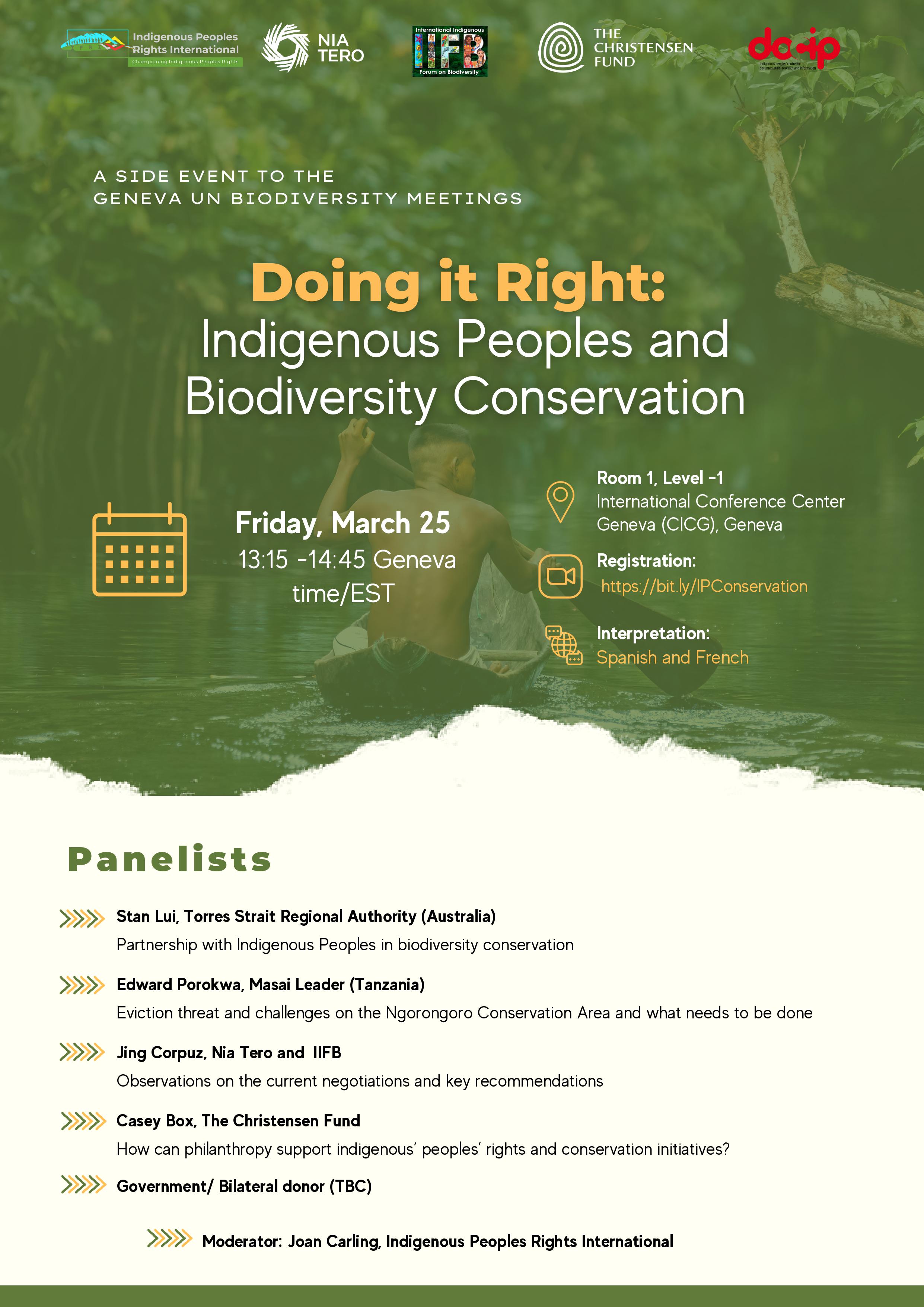A side-event to the Geneva UN Biodiversity Meetings
CO-ORGANIZED BY:
INDIGENOUS PEOPLES RIGHTS INTERNATIONAL- IPRI, NIA TERO, INDIGENOUS PEOPLES FORUM ON BIODIVERSITY-IIFB, THE CHRISTENSEN FUND
Despite the advances in recognition of the rights of Indigenous Peoples, as affirmed in the UN Declaration on the Rights of Indigenous Peoples, their important role in environmental protection, sustainable development, biodiversity conservation and climate change solutions, Indigenous Peoples are still commonly regarded as enemies of conservation in many countries. Exclusionary conservation or fortress conservation is still the policy and practice by numerous states and the prevailing model of a number of international conservation NGOs, where humans are seen as separate from nature. This approach negates the historical continuity and survival of Indigenous Peoples as they have sustained their interdependent and reciprocal relations with nature resulting in the protection and sustainable management of their natural environment.
The Convention on Biological Diversity is currently negotiating a Post-2020 global biodiversity framework in order to prevent global biodiversity collapse, guided by scientific consensus on the need for increased ambition on coverage of protected areas. This renewed commitment, if implemented without safeguards and a commitment to respect Indigenous peoples’ rights, could result in increased pressure on Indigenous lands, leading to widespread displacement. It is important to address what went wrong and the key challenges in biodiversity conservation and do the right thing to advance key solutions with the meaningful participation of indigenous peoples as key partners and actors in achieving the 30x 30 biodiversity target. This provides an opportunity to lead conservation in the right path wherein rights, equity and sustainability are the policy framework and meaningful partnerships are the drivers of this common aspiration.
Objectives
This event will serve as a venue for Indigenous Peoples’ leaders and representatives, and other relevant actors to:
- Discuss good practices of indigenous peoples’ conservation of biodiversity including respectful partnerships and co-management arrangements.
- Present realities on ground on key challenges for indigenous peoples relating to biodiversity conservation.
- Discuss key recommendations in reaching the 30x30 Biodiversity conservation target with the meaningful participation of indigenous peoples.
METHODOLOGY
This event will be a moderated discussion with a distinguished panel of speakers to be followed by discussion with participants. This event will be a face-to-face that will also be accessible online through zoom link and Facebook streaming. There will be interpretation in Spanish and French.
Duration: 90 minutes
A light lunch will be provided.
PANELISTS
Stan Lui, Torres Strait Regional Authority (Australia)
Partnership with Indigenous Peoples in biodiversity conservation
Edward Porokwa, Masai Leader (Tanzania)
Eviction threat and challenges on the Ngorongoro Conservation Area and what needs to be done
Jing Corpuz, Nia Tero and IIFB
Observations on the current negotiations and key recommendations
Casey Box, The Christensen Fund
How can philanthropy support indigenous’ peoples’ rights and conservation initiatives?
Government/ Bilateral donor (TBC)
Moderator: Joan Carling, Indigenous Peoples Rights International


